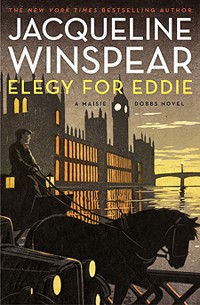 Written by Jacqueline Winspear — This is the ninth book in Winspear’s crime series featuring the charming Maisie Dobbs, an English private detective during the inter-War years. If you like Downton Abbey with a bit more bite and psychology, then you might already be familiar with the series.
Written by Jacqueline Winspear — This is the ninth book in Winspear’s crime series featuring the charming Maisie Dobbs, an English private detective during the inter-War years. If you like Downton Abbey with a bit more bite and psychology, then you might already be familiar with the series.
The author does a fantastic job of recreating the period details, while giving the characters a more modern outlook, more in keeping with our age perhaps. One of the most enjoyable aspects of this series is that it takes place over a lengthier period of time than is usual in crime fiction. You can see Maisie and the secondary characters all grow and change over the course of the years. This is is one of the few series which I would recommend reading in order if you want to get full enjoyment from it.
Elegy for Eddie is set in 1933 and the rumble of concern following the rise to power of a certain German chancellor is spreading to England. However, Maisie is initially more worried about the death of Eddie Pettit, a gentle, simple-minded childhood friend with an amazing gift for calming horses. The costermongers of Lambeth refuse to believe that his death was an accident, and ask Maisie to investigate. She uncovers a motive for murder which goes far beyond Eddie’s modest background, and finds herself struggling to reconcile her humble roots with her current wealth and the social demands being placed upon her. A ruthless press tycoon, a wily politician called Churchill and even the husband of her dear friend Priscilla all seem to be lying and hiding things. Over-analytical as she is, Maisie soon starts questioning her tendency to interfere in other people’s lives and even her own relationship with her fiance, the Viscount James Compton. Surely she is far too independent-minded to become a mere wife and decorative appendage to a peer?
I did find the constant shilly-shallying between James and Maisie rather wearisome and did not feel it added much to the plot. Maisie herself can at times seem too self-righteous and insecure. However, there are, as always in Winspear’s novels, interesting subplots and secondary characters. In this particular case, another strong, independent woman in the form of the artistic Evelyn Butterworth. The denoument may feel a little forced, but fans of Jacqueline Winspear do not read her novels primarily for the plot. Instead, they read the books for a strong female main character, the accurate recreation of a difficult time in world history, and the charm and verve of the writing style. The series reminds me a little of Dorothy Sayers or Josephine Tey, although of course the author makes concessions to our own modern expectations, sensibilities and language. This latest addition to the Maisie Dobbs canon may not be the strongest book in the series, but it is a delightful cosy read with an additional frisson of historical hindsight.
Alison & Busby
Print/Kindle
£5.69
CFL Rating: 4 Stars










